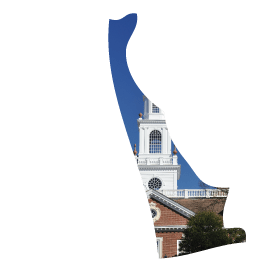Alternate Route Usage and Providers: Delaware
Expanding the Pool of Teachers Policy
Analysis of Delaware's policies
Delaware's
Alternate Route for Teacher Licensure and Certification (ARTC) is only
available for candidates seeking certification in certain critical-needs
secondary subjects and K-12 music and art. Candidates in the Delaware Transition to Teaching Partnership (DT3P) may only teach in grades 6-12 at a high-need school. The Masters Plus Certification Program (MPCP) is limited to special education certification. The Ninety-one Days in Lieu of Student Teaching option also has limits on subjects the candidate is allowed to teach.
Delaware also authorizes Teach For America (TFA) as an alternate route for all grade levels, subjects and geographic areas. Additionally, Relay's Master of Arts in Teaching (MAT) offers certification in all elementary grades and, for middle and secondary grades, English, math, science and social studies.
ARTC, DT3P and MPCP are partnerships between the Department of Education and the University of Delaware.
Recommendations for Delaware
Broaden alternate route usage.
Delaware should reconsider grade-level and subject-area restrictions on the ARTC, MPCP and DT3P. Alternate routes should not be programs of last resort for hard-to-staff subjects, grade levels or geographic areas but rather a way to expand the teacher pipeline throughout the state.State response to our analysis
Delaware noted that state policy does refer to CAEP standards for teacher preparation being upheld but does not explicitly require a program to be approved by CAEP.
Importantly, state policy provides an avenue for ARTC approval by virtue of RFP solicited from the Department of Education, the requirements of which can be defined by the Department (within restrictions of code). Proposals from nonuniversity providers are allowed.
Select another topic
Delivering Well Prepared Teachers
- Admission into Teacher Preparation
- Elementary Teacher Preparation
- Elementary Teacher Preparation in Reading Instruction
- Elementary Teacher Preparation in Mathematics
- Early Childhood
- Middle School Teacher Preparation
- Secondary Teacher Preparation
- Secondary Teacher Preparation in Science and Social Studies
- Special Education Teacher Preparation
- Special Education Preparation in Reading
- Assessing Professional Knowledge
- Student Teaching
- Teacher Preparation Program Accountability
Expanding the Pool of Teachers
Identifying Effective Teachers
- State Data Systems
- Evaluation of Effectiveness
- Frequency of Evaluations
- Tenure
- Licensure Advancement
- Equitable Distribution
Retaining Effective Teachers
Exiting Ineffective Teachers
Pensions
Research rationale
Alternate routes
should be structured to do more than just address shortages; they should
provide an alternative pipeline for talented individuals to enter the
profession.
Many states have structured their alternate routes as a
streamlined means to certify teachers in shortage subjects, grades or
geographic areas. While alternate routes are an important mechanism for
addressing shortages, they also serve the wider-reaching and more consequential
purpose of providing an alternative pathway for talented individuals to enter
the profession. A true alternate route creates a new pipeline of potential
teachers by certifying those with valuable knowledge and skills who did not
prepare to teach as undergraduates and are disinclined to fulfill the
requirements of a new degree.
Some states claim that the limitations they place on the use
of their alternate routes impose quality control. However, states control who
is admitted and who is licensed. With appropriate standards for admission and program accountability, quality can be safeguarded
without casting alternate routes as routes of last resort or branding alternate
route teachers "second-class citizens."
Alternate Route Usage and Providers: Supporting Research
From
a teacher quality perspective—and supporting NCTQ's contention for broad-based,
respectable, and widely-offered programs—there exists substantial research
demonstrating the need for states to adopt alternate certification programs. Independent
research on candidates who earned certification through the alternate-route
Teach For America (conducted by Kane, Parsons and Associates) and the American
Board for Certification of Teacher Excellence (conducted by Mathematica Policy
Research, Inc. and ABCTE) programs has found that alternate route teachers are
often as effective, and, in many cases, more effective, than
traditionally-prepared teachers. See
also M. Raymond, S. Fletcher, and J. Luque, July 2001. Teach for America: An evaluation of teacher differences and student outcomes in Houston, Texas. Stanford, CA: The Hoover Institution, Center
for Research on Education Outcomes.
Specifically,
evidence of the effectiveness of candidates in respectable and selective
alternate certification requirements can be found in J. Constantine, D. Player,
T. Silva, K. Hallgren, M. Grider, J. Deke, and E. Warner, An Evaluation of Teachers Trained Through Different Routes to Certification: Final Report, February 2009, U.S. Department of Education, NCEE 2009-4043; D. Boyd, P. Grossman, H. Lankford, S. Loeb, and J. Wyckoff, "How Changes in Entry Requirements Alter the Teacher Workforce and Affect Student Achievement." NBER Working Paper No. 11844, December 2005; T. Kane, J. Rockoff, and D. Staiger. "What Does Certification Tell Us About Teacher Effectiveness? Evidence from New York City." NBER Working Paper No.12155, April 2006.
A
number of studies have also found alternative-certification programs such as
Teach for America to produce teachers that were more effective at improving student achievement than other teachers
with similar levels of experience. See
Z. Xu, J. Hannaway, and C. Taylor, "Making a Difference? The Effects of Teach for America in High School." The Urban Institute/Calder, April 2007, Working Paper 17;
D. Boyd, P. Grossman, K. Hammerness, H. Lankford, S. Loeb, M. Ronfeldt, and J. Wyckoff, "Recruiting Effective Math Teachers: How Do Math Immersion Teachers Compare?: Evidence from New York City." NBER Working Paper 16017, May 2010.
For
evidence that alternate route programs offered by institutions of higher
education are often virtually identical to traditional programs, see Alternative
Certification Isn't Alternative (NCTQ, 2007) at: http://www.nctq.org/p/publications/docs/Alternative_Certification_Isnt_Alternative_20071124023109.pdf.

